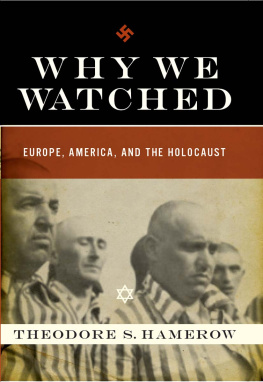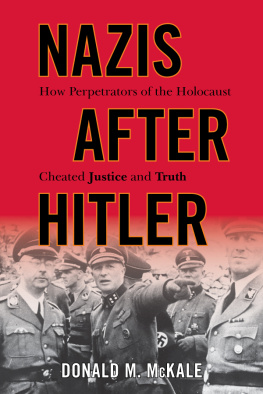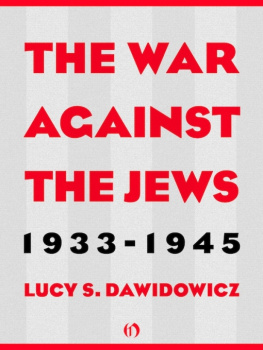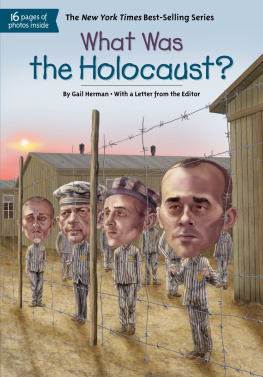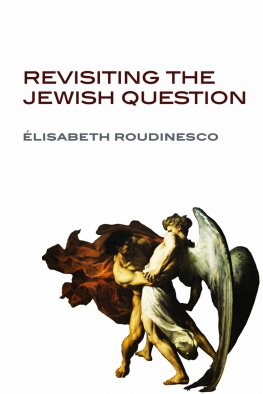Theodore S. Hamerow
WHY WE WATCHED
Europe, America, and the Holocaust

W. W. Norton & Company
New York London
Copyright 2008 by Theodore S. Hamerow
All rights reserved
For information about permission to reproduce selections from this book, write to Permissions, W. W. Norton & Company, Inc.,
500 Fifth Avenue, New York, NY 10110
Library of Congress Cataloging-in-Publication Data
Hamerow, Theodore S.
Why we watched: Europe, America, and the Holocaust / Theodore S.
Hamerow.1st ed.
p. cm.
Includes bibliographical references.
ISBN: 978-0-393-06968-6
1. Holocaust, Jewish (19391945)Causes. 2. AntisemitismEuropeHistory20th century. 3. EuropeSocial conditions20th century. 4. EuropeEthnic relationsHistory20th century. 5. Holocaust, Jewish (19391945)Public opinion. 6. Public opinionUnited States. I. Title.
D804.3.H355 2008
940.53'18dc22
2008004318
W. W. Norton & Company, Inc.
500 Fifth Avenue, New York, N.Y. 10110
www.wwnorton.com
W. W. Norton & Company Ltd.
Castle House, 75/76 Wells Street, London W1T 3QT
To my wife, Diane, with love
Acknowledgments
I COULD NOT have written this book without assistance from a variety of sources, some of them close friends and colleagues, others casual acquaintances or even total strangers. To name all of them would require several pages of acknowledgments, but a few at least should not remain unmentioned. Richard Leffler of the University of WisconsinMadison and David Wetzel of the University of CaliforniaBerkeley read the finished manuscript and offered perceptive and constructive assessments. Among the many archivists whose help I sought, Paul Rood of the United States National Archives and Bob Clark of the Franklin D. Roosevelt Library were especially supportive, far beyond the requirements of their official positions. Judith L. Tuohy of the Memorial Library at the University of WisconsinMadison and Nancy Mulhern of the Wisconsin Historical Society worked tirelessly not only to locate needed materials among their own holdings but also to obtain many others through inter-library loans. And finally, Anita Olson, a former staff member at the University of WisconsinMadison History Department, labored diligently and indefatigably to prepare the manuscript for publication. To them and all the others, my heartfelt thanks.
Introduction
M Y DECISION TO ADD one more book to the vast literature dealing with the destruction of European Jewry is a result, indirectly at least, of that very vastness. I have witnessed in the course of the past fifty or sixty years the transformation of the Holocaust from simply one of the many atrocities committed by a brutal totalitarian regime into a central feature of the Second World War. Today vivid reminders of the Third Reichs murderous anti-Semitic policy are to be found everywhere. There are museums, monuments, memorials, and commemorations. There are remembrances, anniversaries, scholarly meetings, and academic conferences. There are monographs, periodicals, plays, films, and television specials devoted exclusively to the Holocaust. It has become part of the college and even the high school curriculum, with various courses designed to explain its significance and entire departments devoted to the study of its background. It is now as much a part of the history of the Second World War as the siege of Stalingrad or the invasion of Normandy or the Battle of the Bulge. Is there anyone in the United States and Europe who has never heard of Auschwitz?
The Holocaust has in fact become more than an object of remembrance and mourning. It has emerged as a significant element in our culture, attracting the attention of essayists, novelists, Broadway impresarios, and Hollywood moguls. The memoirs of its survivors are being read today with great avidity. Some of those who lived through the terrible years of the Nazi occupation have achieved the status of living martyrs, Jeremiahs warning the rest of us against the evils of racism, bigotry, cruelty, and indifference to human suffering. Movies portraying the brutalities inflicted on the Jews of Europe continue to attract large audiences. Sometimes high school students are urged or even required to see those movies, although the young viewers, bored or rebellious, do not always display the expected solemn respect for what is being shown on the screen. No matter. What counts is that an unspeakable horror that was once largely ignored, often deliberately, is now receiving the attention it deserves. Those who identify with the victims of the Holocaust find a deep psychological satisfaction in the knowledge that these victims, and thus they themselves, are finally receiving the recognition that was for so long denied to them.
Here is the key to the continuing and growing preoccupation with the Holocaust. What accounts for it is not only a resolve to memorialize those who perished so cruelly, scorned and abandoned, more than half a century ago. There is also the feeling that public acknowledgment of the atrocities committed against the victims of the Holocaust represents a tacit admission of injustices that may have been committed against those related to or descended from the victims. This, no doubt, is what the historian Charles S. Maier means by suggesting that the establishment of museums to commemorate the destruction of European Jewry is not motivated solely by an intellectual interest in history; it is also part of a memory industry. The relationship between former perpetrators and former victims cannot be determined by paid debts or material compensations: Confessional memory is demanded as the only valid reparation. The sense of guilt on one side and of victimhood on the other is an essential aspect of the collective remembrance of the Holocaust. It underlies the unremitting efforts to keep the past alive by various external, material reminders.
The success of these efforts is attested to by the growing demand of other aggrieved minorities for acknowledgment of the sufferings they have had to endure and for some form of compensation for those sufferings. Such minorities often regard the original Holocaust, the Jewish one, as a model to be studied and emulated, sometimes with a touch of envy or even resentment. Here again Maier argues that as a claim upon official memory, the victims anguish comes to be seen as a valuable possession. Other peoples also want the status of victimhood.
His argument sounds persuasive. After all, are the Jews the only ones who suffered discrimination, oppression, brutality, and mass murder? What about the ill treatment the African American minority had to endure during centuries of slavery and even afterward? Does it not call for public repentance and commemoration as well? Is it not also part of a holocaust, a Black Holocaust? And what about Native Americans, who once were the proud masters of a continent but are now forced to endure hardship and discrimination on desolate, impoverished reservations? And then there are the Armenian Americans, whose grandparents and great-grandparents were the victims of mass extermination during the First World War. Dont these victims deserve as much sympathy as those who perished in the Second World War? For that matter, there is no reason that the Irish peasants who died in the great famine of the 1840s, while the British government looked on in indifference, should not be recognized as victims of a holocaust as well. Was their fate any less tragic than that of other persecuted minorities in the Old World and the New?
In short, as Maier maintains, all oppressed groups have been encouraged by the example of the Jewish Holocaust to pursue the general goal of seeking respect, attention and validation. The Jews are by no means the only ones demanding attention from others. There are now many more. As a matter of fact, modern American politics, it might be argued, has become a competition for enshrining grievances. Every group claims its share of public honor and public funds by pressing disabilities and injustices. National public life becomes the settlement of a collective malpractice suit in which all citizens are patients and physicians simultaneously.

